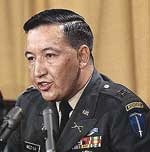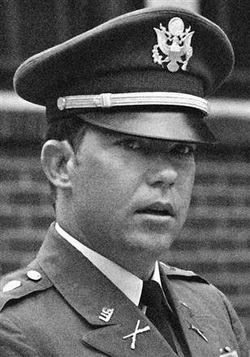Ernest Medina

Ernest Medina served as the commanding officer of the unit that attacked My Lai. In 1971 he faced war crimes charges for his actions during the massacre. Soldier Paul Meadlo testified against Medina claiming, “I don’t know if the C.O. gave the order to kill or not, but he was right there when it happened. Why didn’t he stop it? He and Calley passed each other quite a few times that morning, but didn’t say anything. Medina just kept marching around. He could’ve put a stop to it anytime he wanted.” (18)In response to the charges against Medina his attorney defended his actions by stating, “You can’t afford to guess whether a civilian is a Viet Cong or not. Either they shoot you or you shoot them… This case is going to be important—to what standard do you hold a combat officer in carrying out a mission?” (19) . After a long trial, Medina was acquitted of all charges.
Calley

William Calley
On March 29, 1971, William Calley, the leader of the Charlie Company, was convicted of the premeditated murder of 22 Vietnamese civilians and was sentenced to life imprisonment and hard labor at Fort Leavenworth. But on April 1, 1971, President Richard Nixon had Calley put on house arrest at Fort Benning and then his sentence was reduced to 20 years.
After three and a half years of house arrest, Calley petitioned the courts and Judge Robert Elliott ruled that Calley had not been given a fair trial due to pretrial publicity and denial of subpoenas of certain defense witnesses. In 1974, President Nixon issued Calley a limited Presidential Pardon.
In an exclusive interview he told the Associated Press, “I hope My Lai isn’t a tragedy but an eye-opener, even for people who say war is hell.. My Lai has happened in every war. It’s not an isolated incident, even in Vietnam… The thing that makes My Lai so unique, it was a small tragedy in a small place, but for once, a man was able to see all the hells of war all at once.” (20)
Later in this interview Calley did not apologize for his actions, but instead stated, “I can’t say I am proud of ever being in My Lai, or ever participating in war. But I will be extremely proud if My Lai shows the world what war is and that the world needs to do something about stopping wars. Many people say war is hell who have never experienced it, but it is more than hell for those people tied up in it.”
Forty years after the massacre, Calley finally apologized for his actions in front of members of a Kiwanis Club. He told the group, "There is not a day that goes by that I do not feel remorse for what happened that day in My Lai. I feel remorse for the Vietnamese who were killed, for their families, for the American soldiers involved and their families. I am very sorry." (21)
After three and a half years of house arrest, Calley petitioned the courts and Judge Robert Elliott ruled that Calley had not been given a fair trial due to pretrial publicity and denial of subpoenas of certain defense witnesses. In 1974, President Nixon issued Calley a limited Presidential Pardon.
In an exclusive interview he told the Associated Press, “I hope My Lai isn’t a tragedy but an eye-opener, even for people who say war is hell.. My Lai has happened in every war. It’s not an isolated incident, even in Vietnam… The thing that makes My Lai so unique, it was a small tragedy in a small place, but for once, a man was able to see all the hells of war all at once.” (20)
Later in this interview Calley did not apologize for his actions, but instead stated, “I can’t say I am proud of ever being in My Lai, or ever participating in war. But I will be extremely proud if My Lai shows the world what war is and that the world needs to do something about stopping wars. Many people say war is hell who have never experienced it, but it is more than hell for those people tied up in it.”
Forty years after the massacre, Calley finally apologized for his actions in front of members of a Kiwanis Club. He told the group, "There is not a day that goes by that I do not feel remorse for what happened that day in My Lai. I feel remorse for the Vietnamese who were killed, for their families, for the American soldiers involved and their families. I am very sorry." (21)
